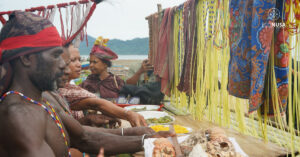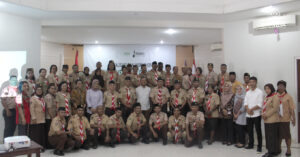
When entering the waters of Manyaifun Island, Waigeo Barat Islands District, Raja Ampat Regency, the EcoNusa team was quite amazed by the calm sea. Understandably, during the journey of the EcoNusa COVID-19 crew, Raja Ampat’s response often passes through choppy waters which makes some of them seasick.
The waters of Manyaifun Island are calm thanks to the shade of Batang Pele Island. There are only two routes to enter Manyaifun, namely from Selpele and Meosmanggara. Because it is still the southern season, the sea is quite shady. On the beach, mangroves or mange-mange line the homestays.
According to Laura Resti of the Perjampat Business Development (Association of Raja Ampat Indigenous People and Business Movers), tourists choose Manyaifun because it is the closest to Wayag. Wayag is described as the iconic coral reef of Raja Ampat which has become global in popularity. From Manyaifun, it only takes three hours to reach Wayag.
Apart from supporting tourism, Manyaifun is also known as the home of the legendary senate mat. The Senat is a traditional Raja Ampat mat that is found in almost every home. It has various functions, from sleeping mats, eating together, to floor mats when chatting with relatives or guests. The Senate is made from the outer bark of the sago tree, which is often found there.
Saturday morning 19 September 2020, clear weather and the sound of the waves accompanied the people of Manyaifun Village who gathered near the sea banyan tree. Some of them are already sitting on senate mats that are held in a semi-permanent building, PAUDNI Immanuel Manyaifun.
Hosea Mambraku, a 26-year-old Manyaifun man, seemed to take the program very seriously. Even though he was not inside, he could still listen to Desi Wanma and Utreks Hembing’s explanations, the agricultural extension agents of the EcoNusa COVID-19 Response Team. Even though he works as a fisherman, he admits that he is also interested in farming and cultivating the land. He has used a plot of land on Batang Pele Island for gardening.
“The people of this village have been moved independently in terms of taking care of the stomach. So, the COVID-19 pandemic will not have a significant impact on providing food for us because it can meet our own food needs, “said Hosea. He also said that usually, the results of fishing in the sea would be sold to Waisai. Meanwhile, the results of gardening are consumed by themselves.
The counseling activity is expected to add insight, information, and capital to the people of Manyaifun Village to meet basic needs or substantial nutrition such as carbohydrates, minerals, protein, vitamins, and many more. The materials presented by Desi and Utreks included techniques for cultivating food crops, the benefits of organic fertilizers, and verticulture farming. In simple terms, they explain the basic techniques of agricultural cultivation, from seeding, harvesting to post-harvest matters. Desi Wanma hopes that this counseling can help the community in implementing the demonstration plot system to meet local food in Manyaifun Village.
On that occasion, the EcoNusa COVID-19 Response Team provided support in the form of organic fertilizer in the form of Petro Bio, manure, liquid fertilizer, various vegetable seeds, including agricultural tools such as hoes, sprayers, crop shears, boots, farmer hats, polybags, and handcarts.
Matheos Yacobus Rayar as Field Associate of EcoNusa gave the idea to create a farmer group because the number of agricultural tools distributed was limited. The responses are quite mixed. Understandably, Manyaifun residents usually do everything individually. Fishing, gardening, and making senate mats are all done without a group system.
Although we cannot yet imagine what the farmer group will look like, according to Hosea, the idea needs to be tried because the agricultural equipment and seeds provided can be managed together.
“A cart can be used with another standard, and I see people happy to accept it. I hope this group can be useful, “said Hosea.
After a dialogue with the village government, it was agreed to divide the 43 residents who came to the counseling into 10 farmer groups. The atmosphere became boisterous like a market. All negotiate to find group members and determine who will be the leader.
That day, the agricultural equipment provided by the EcoNusa COVID-19 Response team opened their opportunity to try new things, namely managing natural resources in their area in groups.
Editor: V. A Wulandani & Leo Wahyudi



